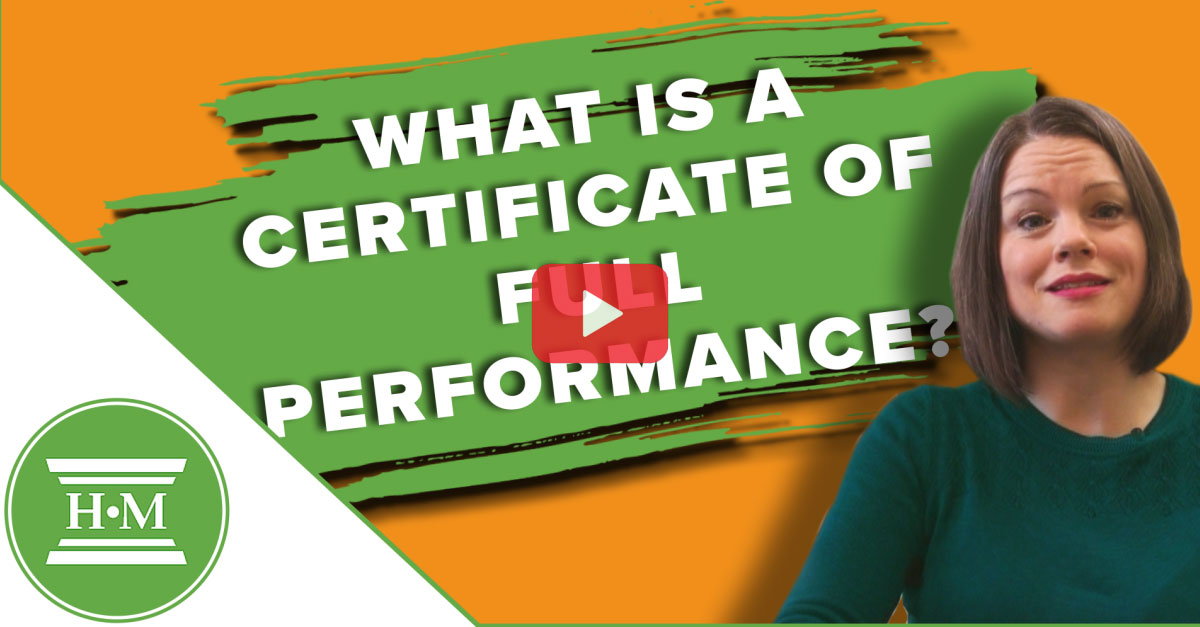
Once you have filed your consumer proposal and it has been (deemed) accepted by your creditors and (deemed) approved by the court, there are really only two requirements left to meet: attend two mandatory financial counselling sessions and comply with the terms of your consumer proposal, which include making your monthly payments.
Upon completion of these duties, a Certificate of Full Performance will be issued to you. This is the final stage of the consumer proposal process.
Table of Contents
What is a Certificate of Full Performance?
When is your consumer proposal finished? And what does this mean?
Hi, I’m Maureen Parent, a Licensed Insolvency Trustee with Hoyes, Michalos & Associates. A certificate of full performance is a legal release from your debts given to you by your consumer proposal administrator, also known as, a licensed insolvency trustee after the completion of two credit counselling sessions and your last proposal payment. It is proof that you satisfied the terms of your consumer proposal and that your debts have been discharged.
A consumer proposal deals with unsecured debts that were outstanding as of the date you originally filed your proposal. Once you complete all of the requirements of your proposal, you are released from these unsecured debts and your licensed insolvency trustee will issue your certificate of full performance. You will also receive a statement of receipts and disbursements and a notice of taxation of the administrator’s accounts, as well as, documents showing the discharge of the administrator. These are all final documents that your consumer proposal administrator will send to you, your creditors, and the official receiver when the administrator closes your file.
There are certain types of unsecured creditors that cannot be eliminated in your consumer proposal such as court imposed fines, support payments, student loans if they are newer than seven years old, and a consumer proposal does not deal with secured debt like your mortgage or car loan, unless you want to surrender them. Be sure to talk to your trustee about what debts might remain even after your proposal is finished. If they are still outstanding, you will be required to pay them.
Once you have completed all of your proposal terms and your certificate of full performance is issued, the Office of the Superintendent of Bankruptcy will report the date of completion of your proposal to the credit bureaus.
Sometimes the debt that was included in your consumer proposal is part of a batch sale to a third party collection agency. Don’t panic. It happens and sometimes even many years after you’ve completed your proposal. If you receive a call from a collection agency at any time after you have filed your consumer proposal, let them know that you have followed their proposal and provide them a copy of either your consumer proposal documents or your certificate of full performance as proof.
You can always contact your Licensed Insolvency Trustee for assistance with any issues regarding the consumer proposal process. We are here to help. To learn more about debt relief and how a consumer proposal works, visit us at hoyes dot com.
A Certificate of Full Performance is a legal release from your debts, given to you by your Consumer Proposal Administrator after the completion of your last proposal payment. It is proof that you satisfied the terms of your consumer proposal and that your debts have been discharged.
When you complete your consumer proposal, you will also receive a Statement of Receipts and Disbursements and a Notice of Taxation of the Administrator’s Accounts, as well as, the Discharge of the Administrator. These are all final documents that your Consumer Proposal Administrator will send to you, your creditors, and the Official Receiver when the administrator closes your file.
What debts are released when you receive your Certificate of Full Performance?
Upon completing a consumer proposal, you are released from most of your unsecured debt.
An unsecured creditor does not have a direct claim on any of your assets (e.g. vehicle or house). If your unsecured creditor has an execution or judgment against an asset, these can usually be removed once you complete your consumer proposal.
Typical unsecured creditors that are dealt with in your consumer proposal are:
- Credit card debts;
- bank loans or lines of credit not secured by an asset;
- payday loans;
- government guaranteed student loan debt, greater than 7 years from your end of study date
- most tax debts unless the government already has a lien registered against your property.
However, there are certain types of unsecured creditors that cannot be eliminated in your consumer proposal:
- A joint debtor’s liability
- Spousal or child support payments
- Alimony
- A debt arising out of fraud
- Any court-imposed fines and penalties
- Student loans if your end of study date is less than 7 years from the date you filed your consumer proposal
- Restitution orders
Debts remaining after proposal is completed
Once you have your Certificate of Full Performance, and the Administrator has been discharged, you will be required to pay any outstanding debts arising out of fraud, fines or penalties, restitution orders. Of note, your liability to pay spousal support, child support or alimony is not stayed by filing a consumer proposal, meaning if you have the obligation to pay alimony, spousal and/or child support, you must continue to pay.
Regarding student loan debt incurred less than 7 years from the date you filed your consumer proposal, you will likely have spoken with your Licensed Insolvency Trustee and were either making interest only payments or modest payments during your consumer proposal. When your proposal is completed, you can start making bigger payments to your student loans to eliminate this debt quickly as well.
Certificate of Full Performance and your credit report
The Office of the Superintendent of Bankruptcy will report the date of completion of your proposal to the credit bureaus.
A consumer proposal filing remains on your creditor bureau for 6 years from the date you filed your proposal or 3 years from the date of completion of your proposal, whichever comes first.
You will want to follow up with the credit bureaus, TransUnion and Equifax, a couple of months after your consumer proposal is completed to ensure that your proposal completion is reflected in your credit report. If your proposal completion does not show properly, fill out the credit bureau’s dispute credit report form and provide them with a copy of your Certificate of Full Performance so they can make the necessary update to your record.
What if I still receive collection calls after completing my consumer proposal?
Sometimes a debt that was included in your consumer proposal is part of a batch sale to a third-party collection agency. This sale can take place even if you completed the consumer proposal many years ago. If you receive a call from a collection agency at any time after you have filed your consumer proposal, let them know that you have filed a proposal and provide them a copy of either your consumer proposal documents or your Certificate of Full Performance as proof.
You can always contact your Licensed Insolvency Trustee for assistance with any issues regarding the consumer proposal process. We are here to help.





